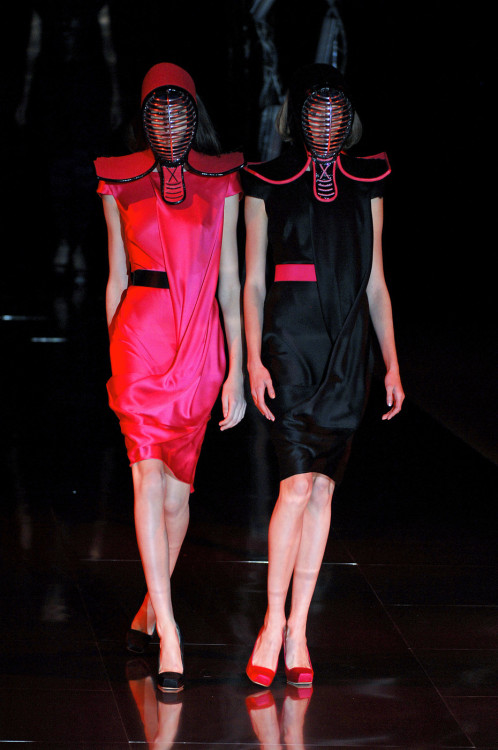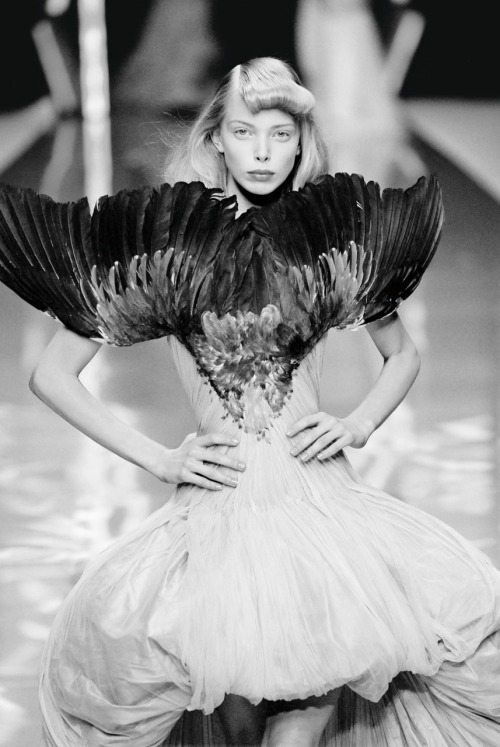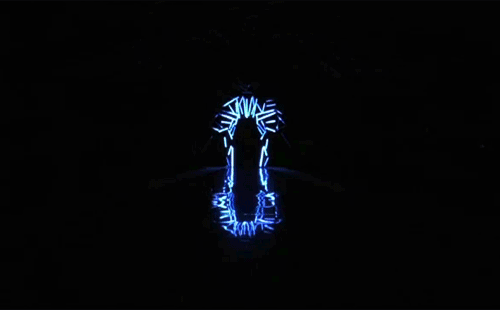Despite collaborating with MAC and launching
various diffusion lines, McQueen’s A/W 2007 collection didn’t sell as well as
was expected. This created a sense of pressure and expectation around his S/S
2008 presentation, entitled ‘La Dame Bleue’ (which can be seen in full here). The show itself was a
collaboration with world-renowned milliner Philip Treacy as the two banded
together to pay tribute to the fashion legend that discovered them both,
Isabella Blow. Their history began when she attended his graduate show and
decided to buy the entire collection - from that moment onwards Blow and
McQueen became close friends. She was always the first to champion his designs
and he in turn saw her as his muse, leading the designer to claim that he felt “a
huge hole in his life” when Blow finally succumbed to a lengthy battle with
depression and committed suicide in 2007.
The show was introduced by an invitation that
depicted a triumphant Blow resplendent in a carriage drawn by two white winged
horses. Wearing a feathered McQueen dress and a Philip Treacy headpiece, the
invitation was both a peek at what was to come as well as an introduction to
the avian references which were omnipresent throughout the collection – the first
of which came courtesy of a giant structure at the back of the runway designed
to represent two enormous LED wings. Blow’s favourite scent was sprayed around the
building to welcome the guests and to set the scene; as the lights dropped, the
wings began to illuminate and the show commenced.
The presentation began with a series of
sombre-looking dresses, all executed in grey tweed and accessorised with
flashes of bright red and deliciously elaborate headpieces. The obi-style
sashes were at once a nod towards the vague oriental influences of the collection
and the butterfly headpiece in particular announced Treacy’s participation in
the designs. One overwhelming theme was that of nature – a theme which moved
between sharp skirt suits made from python skin and glorious full-length technicolour
dresses emblazoned with the prints of a bird of paradise. Dip-dyed silk and
floaty chiffon were tightly cinched in a nod to the iconic McQueen silhouette,
and tweed suits featured moulded hips and shoulders in order to emphasise
curves. The bird motifs continued with models showcasing an array of feathers
both on their headpieces and, in some occasions, on delicate painted wings
which were applied to their face in lieu of make-up.
The collection was at once an attempt to regain
the attention of the buying public and a reminder of what McQueen did best,
meaning that all of his staple pieces were on display. The suits were an
example of his tailoring skills, all of which were mounted on canvas and
hand-toiled. Some of the dresses in particular were more like sculptures than
clothing, taking the female silhouette and giving it a new lease of life with
exaggerated shoulders, tiny corsets and dramatic full skirts. The butterfly and
python screenprints were another example of technical ability, one which would
soon come to be fully-realised in his 2010 ‘Atlantis’ collection. At least for
the one season, McQueen chose to downplay the set design and the theatrics,
allowing the media to simply sit in silence and absorb the clothing – it was a
tribute, a spectacle and a memorial to one of fashion’s most important women.





No comments:
Post a Comment